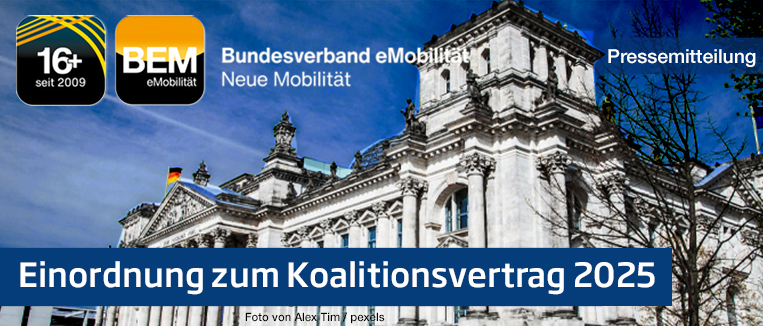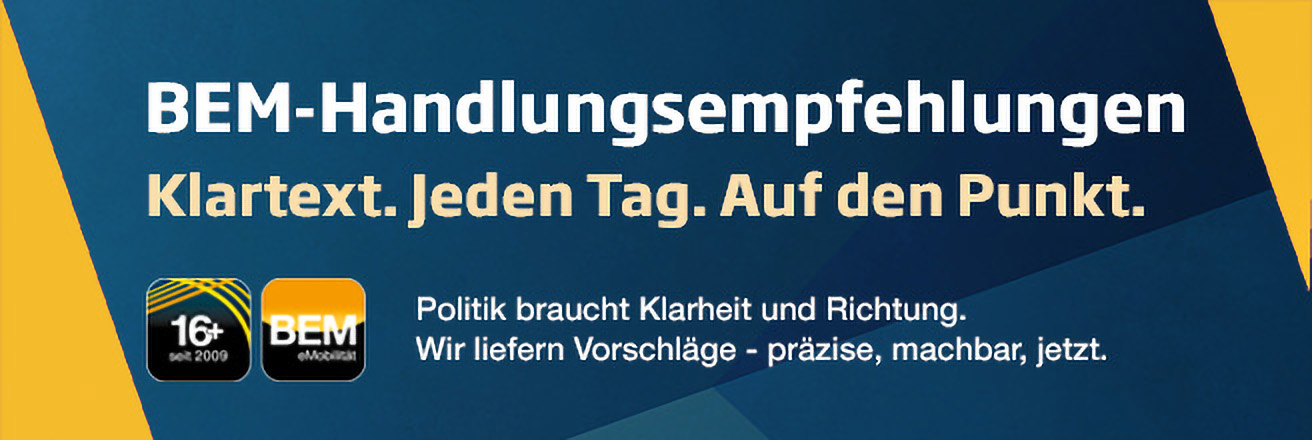
Coalition agreement 2025: Bundesverband eMobilität sees light and shade for new mobility
In view of growing geopolitical tensions, volatile markets and global transformation dynamics, a common European strategy is needed in the coming years to ensure security of supply, industrial resilience and attractiveness as a business location. The mobility and energy transition can only succeed if it is embedded in a stable, affordable and climate-friendly overall European system.
Berlin, 9 April 2025. The coalition agreement presented today by the new federal government consisting of the CDU, CSU and SPD is entitled »Verantwortung für Deutschland« (Responsibility for Germany) – but from the point of view of the Bundesverband eMobilität e.V. (BEM), it falls short of what is necessary in key points. The 150-page document does contain some positive signals in favour of electromobility and the development of a sustainable mobility system. However, it lacks clear regulatory guidance, bold design and the urgently needed European perspective.
»There are rays of hope – for example in the charging infrastructure, battery production and individual support measures for e-vehicles«, explains BEM board member Christian Heep. »But the big picture has yet to materialise. The agreement remains vague and the much-cited transformation has been watered down in key areas.«
Positive approaches to promotion and infrastructure
The agreement is committed to the further development of e-mobility, including through
:
- Tax benefits (including company car scheme, special depreciation allowances)
- Vehicle tax exemption for e-vehicles until 2035
- Support programmes for lower-income households
- Toll exemption for emission-free lorries beyond 2026
- Expansion of the charging and fast charging infrastructure as well as commercial depot charging
- Promotion of battery cell production and the circular economy
- Investment in digitalisation, AI and autonomous driving
- Criticism of technology openness and lack of targets
At the same time, the BEM criticises the continuation of so-called technology openness as a political guideline: »Instead of making a clear commitment to emission-free mobility, politicians are prolonging the uncertainty for industry and investors with this strategy«, says Markus Emmert, BEM Board Member. The promotion of plug-in hybrids (PHEV) and range extenders (EREV) will continue despite climate criticism. There are no binding CO₂ targets, clear fleet quotas for zero-emission vehicles or concrete regulatory roadmaps. The goal of avoiding fines for fleet limits also points more to a retreat than a resolute climate policy.
Lack of European integration
In an additional point of criticism, the BEM emphasises the lack of a strategic European link. Although reference is made to European energy and transport issues, there is no holistic coordination with the European green economy – in the sense of a Europe United. »Particularly in an environment characterised by international competition, there needs to be clear European cooperation on mobility and energy issues. This aspect is not sufficiently addressed in the coalition agreement«, emphasises Heep.
Conclusion and outlook
The coalition agreement contains some progress, but it lacks clarity, ambition and international positioning. The BEM will judge the German government by its actions and continue to consistently campaign for reliable framework conditions and the strengthening of the green economy.
Background
In November 2024, the BEM sent election test stones to the parties for the German general election and in March 2025 published its current recommendations for action to politicians, in which key measures for the successful implementation of the mobility and energy transition are outlined. As part of a daily LinkedIn campaign, the association is currently publicising the content and actively contributing to the political debate:
👉 www.bem-ev.de/handlungsempfehlungen
👉 Ausführliche BEM-Analyse des Koalitionsvertrags im Bereich eMobilität (PDF)
The Bundesverband eMobilität (BEM) is an association of companies, institutions, scientists and users from the field of electromobility who are committed to converting mobility in Germany to electromobility based on renewable energies.
The BEM’s tasks include the active networking of economic players for the development of sustainable and intermodal mobility solutions, the improvement of the legal framework for the expansion of e-mobility and the enforcement of more equal opportunities in the transition to low-emission drive concepts.






